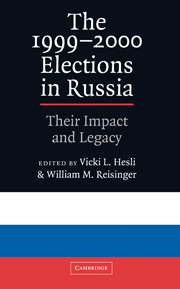Book contents
- Frontmatter
- Contents
- Contributors
- Acknowledgment
- SECTION I INTRODUCTION
- SECTION II PARTIES IN THE ELECTORATE
- 2 Television, Voters, and the Development of the “Broadcast Party”
- 3 Parties, Voters, and Foreign Policy
- 4 The Foreign Policy Implications of the Elections
- 5 Parties, Leaders, and Voters in the Parliamentary Election
- SECTION III THE ROLE OF REGIONAL POWER
- SECTION IV PARTIES AND INSTITUTIONS
- SECTION V CONCLUSION
- Bibliography
- Index
4 - The Foreign Policy Implications of the Elections
Published online by Cambridge University Press: 23 October 2009
- Frontmatter
- Contents
- Contributors
- Acknowledgment
- SECTION I INTRODUCTION
- SECTION II PARTIES IN THE ELECTORATE
- 2 Television, Voters, and the Development of the “Broadcast Party”
- 3 Parties, Voters, and Foreign Policy
- 4 The Foreign Policy Implications of the Elections
- 5 Parties, Leaders, and Voters in the Parliamentary Election
- SECTION III THE ROLE OF REGIONAL POWER
- SECTION IV PARTIES AND INSTITUTIONS
- SECTION V CONCLUSION
- Bibliography
- Index
Summary
The options available for a particular political regime in the sphere of international relations result to a large extent from the interplay between its available resources or capabilities and the intentions and choices of the major political actors within that regime. Particular choices made by key political actors are especially important during periods of regime change and transition. This chapter shares an actor-oriented approach to the issue of democratic transitions and reviews the foreign-policy aspects of the Russian transition; the dramatically decreased foreign policy resources available to the regime of Yeltsin's successor, Vladimir Putin; and the evolving foreign-policy orientations of the major groups within the new Russian political class and Russian public.
The 1999 and 2000 elections mattered for Russian foreign policy because the change from the Yeltsin administration to the Putin administration provided an opportunity for political elites to revise their perceptions of the outside world, to rethink Russia's place in it, and to adapt Russia's foreign policy to the new realities. The elections also mattered because they put the formidable resources of the Russian presidency into the hands of Putin. Understanding his foreign-policy views is critical, not only for insight into Russian foreign behavior but to shed light on an important facet of regime change and democratic transition. Despite Putin's programmatic support for the idea of democracy and his pro-Western slogans, substantial uncertainty about his foreign-policy course prevailed in 2000 and 2001.
- Type
- Chapter
- Information
- The 1999–2000 Elections in RussiaTheir Impact and Legacy, pp. 73 - 89Publisher: Cambridge University PressPrint publication year: 2003



